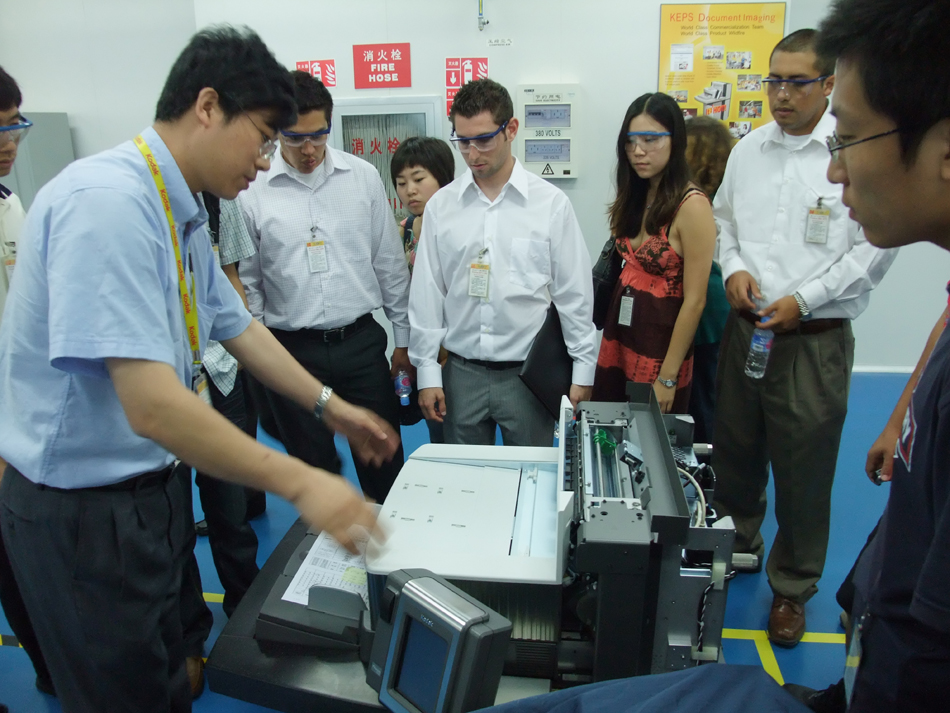
UCSB Awarded Additional $4 Million by the National Science Foundation For Research and Training Partnership with China
The National Science Foundation (NSF) has renewed and increased funding for UC Santa Barbara's pioneering research and education partnership with China in chemistry, chemical engineering, and materials science. The UCSB project will focus on technological research of international importance related to the development of clean energy and energy conservation.
Over the next five years, the campus will receive a total of $4 million –– an increase of $1.5 million over the previous award –– to expand collaborations with leading universities and research institutes in China.
The NSF funds will also support the development of a new alliance with the Max Planck Institute for Biophysical Chemistry and the Fritz Haber Institute, both in China and Germany.
According to the National Science Foundation, its Partnership for International Research Education (PIRE) program seeks to create new international collaborations through long-term, large-scale projects that contribute to the development of a diverse, globally educated U.S. science and engineering workforce.
The UCSB initiative was selected to win renewed NSF support from among 83 proposals submitted in all areas of science and engineering.
"We are excited that UCSB is cultivating what so far has been a fairly unique connection between research intensive universities in the U.S. and China," said Susannah Scott, a professor of chemistry and chemical engineering at UCSB and director of the project.
"UCSB graduate students will have an opportunity to contribute to the remarkable research advances made in China and develop a firsthand awareness of opportunities available to internationally engaged technology professionals."
UC Santa Barbara Chancellor Henry T. Yang congratulated the PIRE team for their highly successful and innovative research collaboration.
"The UCSB partnership has already done a remarkable job of exposing our students and researchers to science and engineering activities in China," said Yang.
"The expanded National Science Foundation initiative will enable UCSB faculty members to advance research in this important area and will result in long-term educational benefits for our students, who will graduate with unique skills to engage in international and intercultural technical collaboration and be well positioned to become leaders in global technology companies."
The UCSB program is formally called the Partnership for International Research and Education: Advancing the U.S.-China Partnership in Electron Chemistry and Catalysis at Interfaces.
It will bring together 14 campus research groups specializing in catalysis and surface science with their counterparts from leading institutions in the People's Republic of China, to mentor a select group of Ph.D. students from the two countries.
Innovations in heterogeneous catalysis represent technological solutions to many pressing energy and environmental problems, including fuel cell development, combustion optimization, and the elimination of toxic chemical side-products of energy production and utilization.
"We expect students at all levels to be highly motivated by the prospect of working on some of the most pressing energy and environmental issues we presently face, and contributing solutions via improved fundamental understanding of catalyst structure, function, and activity," said Scott.
"These experiences will profoundly influence their career directions."
The Chinese partners include the Dalian Institute of Chemical Physics; the Dalian University of Technology; Fudan University; Xiamen University; the University of Science and Technology of China; the National Tsinghua University; the Suzhou Institute of Nanotechnology and Nanobionics; and Dow Chemical.
Additional collaborations with the newly established Dalian National Laboratory for Clean Energy Research; the Shanghai Synchrotron Radiation Facility; and the Shanghai Deep Ultraviolet Free Electron Laser will result in new research opportunities for UCSB scientists and students.
The Max Planck Society for the Advancement of Science, of which the Max Planck Institute for Biophysical Chemistry and Fritz Haber Institute in Germany are a part, has a long history of collaboration with China in catalysis research.
UCSB's affiliation with the renowned research organization will create a "European wing of outreach to China," Scott noted, with additional resources and educational opportunities.
The expanded program will enable UCSB to increase the number of graduate and postdoctoral researchers in chemistry, chemical engineering, and materials science who will go to China in one or more different ways: extended research stays lasting three to six months, special technology transfer study tours of China, and annual workshops where students present their research.
The extended research visits will include Chinese language and cultural sensitivity training for UCSB participants, with reciprocal support given to Chinese participants coming to UCSB.
Student participation in the program will be on a competitive basis.
It is expected that China will sponsor an equal number of students to participate in extended research visits to UC Santa Barbara. As a result of the partnership, UCSB's Technology Management Program has developed two courses that address the emergence of China as a major destination for technology businesses.
In addition to Scott, the program's leadership at UCSB includes Peter Ford, professor of chemistry and biochemistry; Michael Gordon, assistant professor of chemical engineering; and Horia Metiu, professor of chemistry and biochemistry.
Other program coordinators are Alec Wodtke, UCSB emeritus professor of chemistry and biochemistry, who was recently appointed director of the new Center for Advanced Studies in Energy Conversion at the Max Planck Institute for Biophysical Chemistry; and Xueming Yang, director of the State Key Laboratory for Molecular Reaction Dynamics at the Dalian Institute of Chemical Physics.
Xueming Yang earned his Ph.D. in chemistry from UCSB in 1991.
"Multinational corporations are always looking for people with technical training, global experience, and an international outlook with the ability to work cross-culturally," Scott added.
"We believe this type of training gives our students an added edge in their careers."
Related Links



